
In Western societies, the impact of air pollution on residents' health is higher in less wealthy communities. However, it is not clear whether such an interaction effect applies to developing countries. The authors examine how the level of community development modifies the impact of air pollution on health outcomes of the Chinese elderly using data from the third wave of the Chinese Longitudinal Health Longevity Survey in 2002, which includes 7,358 elderly residents aged 65 or more years from 735 districts in 171 cities. The results show that, compared with a 1-point increase in the air pollution index in urban areas with a low gross domestic product, a similar increase in the air pollution index in areas with a high gross domestic product is associated with more difficulties in activities of daily living (odds ratio = 1.41, 95% confidence interval (CI): 1.09, 1.83), instrumental activities of daily living (linear coefficient = 0.98, 95% CI: 0.58, 1.37), and cognitive function (linear coefficient = 2.67, 95% CI: 1.97, 3.36), as well as a higher level of self-rated poor health (odds ratio = 2.20, 95% CI: 1.68, 2.86). Contrary to what has been found in the West, Chinese elderly who live in more developed urban areas are more susceptible to the effect of air pollution than are their counterparts living in less developed areas.
Available at: http://works.bepress.com/rongjun_sun/11/
